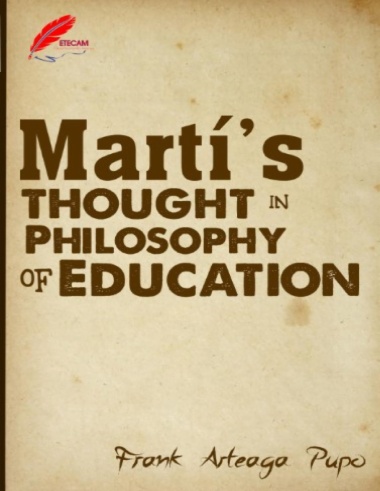The book contains arguments on the anthropological, epistemological, teleological functions of educational philosophy; the experiential pedagogical experience as a qualitative research resource; the principle of an education from, during and for life, as a premise; the discipline of History in professional training; actuality of The Golden Age; importance of reading and its reflection as a function of life; Marti's ideology in Cuban culture; utopia of the Apostle's existence in the digital era; classic models for scientific writing; differences between the experiential and experimental methods. Marti's spirituality as a safeguard of the nation; the philosophical perspective of the Apostle in scientific writing and communication; and thought and the nation as components of Cuban spirituality. The relationship between these contents constitutes the theoretical and practical platform of Marti's Educational Philosophy in pursuit of human improvement.
- Cover
- Copyright page
- Contenido
- Foreword
- Introduction
- Chapter I: Philosophy of education and culture from Martí’s thought and work
- 1.1. Background
- 1.2. Some functions of the Philosophy of Education
- Chapter II: The living pedagogical experience as a method of the investigation process
- Chapter III: Perspective to educate from, during and for life
- Chapter IV. History in professional training: Martí’s perspective
- 4.1. Professional training: Martí’s perspective
- 4.2. Martí’s pedagogical thought in the emancipation of our America
- 4.3. Contemporariness of the Golden Age
- Chapter V: Reading, thinking and doing from José Martí
- 5.1. Make José Martí
- 5.2. On the Martí’s thought in Cuban culture
- 5.3. José Martí and (in) the digital ERA
- Chapter VI. Scientific drafting
- 6.1 Classic models by and for scientific drafting
- 6.2 Reading, Martí’s legacy for contemporary university
- 6.3 Differences between the experiential and experimental methods
- 6.4 Martí’s spirituality as safeguard of the nation
- 6.4.1 How does the evolution of spirituality take place from hominization?
- 6.4.3 Aesthetic dimension of Martí's spirituality as the foundation and defense of the nation
- 6.5 Scientific drafting and communication: Martí philosophical perspective
- 6.6 Thought and nation: components of Cuban spirituality
- References

